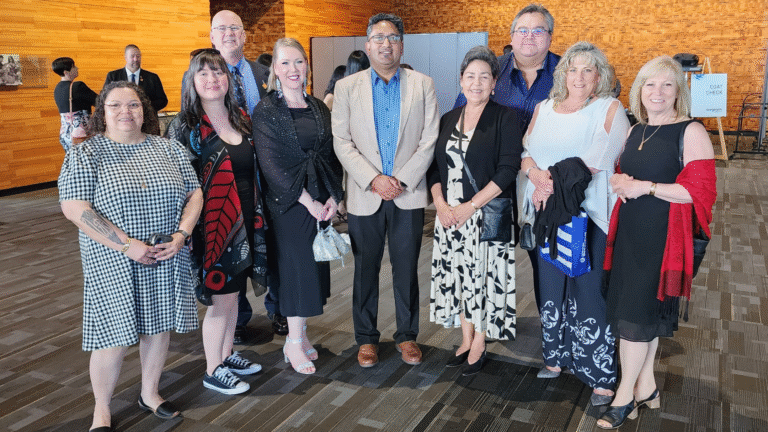
Every Nation faces the same questions: How do we strengthen governance? How do we prepare for audits? How do we build leadership that lasts? And most importantly, how do we bring prosperity to our Nation? At AFOA BC, these questions are not problems to solve once, but pathways we continue to walk together.
AFOA BC, Always in Motion
Fall is a glimpse into a year of learning and development for BC’s Indigenous communities, as our instructors hit the road to teach Audit Prep and meet members throughout the province. During September and October, our team facilitates Audit Prep workshops in four different cities, while also preparing for the Indigenous Youth Entrepreneur Summit & Job Fair, in partnership with Bears Lair Dream Camps.
Every day is filled with arranging venues, confirming speakers, booking travel, handling registrations, coordinating with sponsors, and working with government and educational partners. A small but dedicated team carries this work forward to ensure each event runs smoothly and provides real value.
For participants, these sessions are more than dates on a calendar. They are opportunities to gain practical tools, exchange ideas, and return to their Nations ready to strengthen administration, governance, or finance systems.
A Small Group of People, A Big Idea
It was not always this way. In the mid-1990s, there were no guidelines, no roadmap, and little support. People working in finance roles in Indigenous communities often felt isolated, trying to figure things out on their own. How do you manage band finances? How do you hold elections? How do you prepare for an audit without training?
A few professionals began reaching out to one another. They shared their struggles, compared notes, and realized they were not alone. From those conversations came an idea: what if they organized a conference to bring people together and see who might attend? That spark gave rise to a model that has stood the test of time.
They approached the Government of Canada, which showed interest but questioned whether enough people would respond. Would there really be an audience?
The first conference, held in 1994, proved that the demand was there. Attendance far exceeded the target, confirming the need for connection and training. By 1996, funding was secured, and AFOA BC was formally established as a non-profit society with a clear purpose: to support one another, build capacity through training, and provide a professional home for people committed to strengthening governance and administration in their Nations. The model became so effective that AFOA BC contributed its experience to the creation of AFOA Canada in 1999, expanding the approach nationally through chapters across the country.
Carrying the Mission Home
That same spirit is visible today each time an AFOA BC event concludes. Participants do not simply leave; they carry something with them. They bring home strategies to improve daily administration, prepare more effectively for audits, or strengthen governance systems. Many also leave with new ambitions, ranging from sharing knowledge with their teams to pursuing professional designations that can lead to long-term stability.
There are many ways to seek training, but people return to AFOA BC because of trust. They know the organization understands their realities and will come to their communities, even the most remote, if needed, to work side by side. That willingness to meet people where they are has always been part of AFOA BC’s character, and it remains one of the strongest reasons members continue to rely on us.
More Than Numbers
As AFOA BC matured, communities made it clear that finance was only part of the picture. Nations were not only seeking support with budgets and audits, but also with how to strengthen councils, manage elections, or stabilize their staff—the “revolving door” of hiring and turnover created uncertainty. Without consistent HR practices, governance structures, and leadership training, financial management could not stand on its own.
Step by step, AFOA BC responded. Programs joined courses on audit preparation in human resources. Conversations about accounting expanded into training on governance and council responsibilities. Leadership development has become a cornerstone, with pathways to designations such as CAFM and CAPA (certified by AFOA Canada), which equip professionals with the skills to address common day-to-day challenges.
The result is an integrated approach. Finance, HR, governance, administration, and leadership are not separate tracks but interconnected parts of the same system. When one area is strengthened, the others benefit. AFOA BC continues to bring these elements together, offering members opportunities to build not only their own skills but also the capacity of their Nations.
Building Capacity Together
At the heart of AFOA BC is a simple but powerful mantra: Building Capacity Together.
Lasting change doesn’t happen in isolation—it’s a collective effort. At AFOA BC, our team walks alongside members on their professional journeys, guided by a shared vision of prosperity and capacity-building. This progress is only possible through the trust of our members, the support of sponsors and partners, and the collaboration of governments and educational institutions. Together, we move forward.
It’s this network of people and organizations that keeps the fire burning—what began as a small spark in 1994 has grown into something lasting and powerful. By being part of this community, you’re contributing to something greater than any one moment or individual. Our mission is to advance Indigenous finance, governance, and leadership—today and for generations to come.
We are building capacity together, and there is a place for you in this journey.
To the dedicated group of individuals working in Indigenous governments and organizations who recognized the need to support and educate those in financial management roles. Led by Norman Taylor, along with Lynne Anderson, Cecil Cheveldave, Elaine Eccleston, and Eileen Stephenson, the group overcame significant obstacles and successfully held the first conference in 1994.
